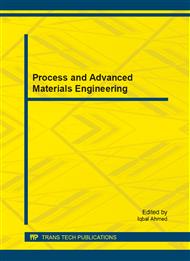p.718
p.722
p.726
p.730
p.737
p.741
p.745
p.749
p.753
Use of Waste Coconut Oil Obtained from Waste Water Pond of Coconut Milk Plant to Produce Biodiesel
Abstract:
Waste coconut oil obtained from waste water pond contains high free fatty acid (FFA) which is not suitable to produce biodiesel via transesterification. The two steps of reaction (esterification and transesterification) were used to produce biodiesel from waste coconut oil. The result showed that FFA decreased from 92.95%wt to nearby 2%wt under the conditions of 80%vol of methanol to oil, 4%wt of hydrochloric acid and 4 h of reaction time in esterification step. In addition 95.34%wt conversion of fatty acid methyl ester (FAME) could be achieved in 1 h when 20%vol methanol to oil and 0.5%wt of sodium hydroxide in transesterification step. The fuel properties of waste coconut oil biodiesel were mostly met well within the ranges specified in biodiesel standard.
Info:
Periodical:
Pages:
737-740
DOI:
Citation:
Online since:
September 2014
Authors:
Keywords:
Price:
Сopyright:
© 2014 Trans Tech Publications Ltd. All Rights Reserved
Share:
Citation:


